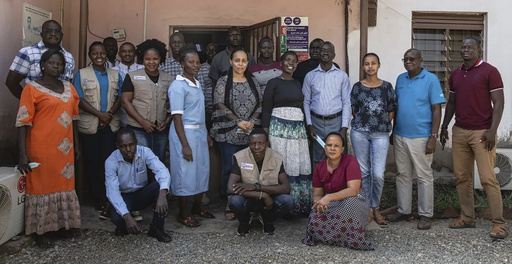
In a warehouse located in Haiti, approximately four metric tons of seeds are unable to be distributed, with the planting season fast approaching its end. This situation poses a significant risk of missing the optimal window for these seeds to yield vital food sources for the local population. Meanwhile, in South Sudan, a vital program aimed at treating severely malnourished children under five years of age has come to a standstill. Both initiatives are managed by World Relief, an evangelical organization that has faced substantial operational challenges after the previous administration decided to freeze a majority of foreign aid and diminish the role of the U.S. Agency for International Development (USAID).
Faith-based organizations that collaborate with the U.S. government to provide international assistance are currently struggling due to the halt in USAID operations. These organizations are confronting layoffs, furloughs, and a critical lack of funding, forcing remaining team members to make tough decisions regarding which life-saving programs can persist without governmental support. “That’s what keeps me up at night,” expressed Matthew Soerens, the vice president of advocacy and policy at World Relief.
Among the twelve largest non-governmental organizations receiving USAID funds, many are faith-based, notably Catholic Relief Services (CRS) and World Vision. These Christian nonprofits cater to millions globally, offering food, water, and healthcare in crisis-hit areas. CRS, which was established by U.S. Catholic bishops in 1943, has informed its staff to brace for drastic workforce reductions — potentially up to 50% — due to the cuts in U.S. foreign assistance. The organization is the top recipient of USAID support, having received nearly half of its $1.2 billion budget for 2023 from the government.
Caritas, the Vatican’s charitable arm, has expressed urgent concern, warning that the U.S. decision to cease USAID funding could lead to the deaths of millions and place hundreds of millions into severe poverty. While the State Department has provided a few waivers for specific organizations to continue critical humanitarian efforts, many affected groups report delays in receiving federal funding. Organizations that obtained waivers note challenges in acquiring clear guidance from the U.S. administration, and USAID staffers have indicated uncertainty regarding the processes for evaluating waiver requests.
World Relief has been granted a waiver to maintain operations in Sudan, which is experiencing ongoing civil unrest; however, they continue to await government payments for these programs and past work completed. “We can’t afford to misunderstand the instructions and spend resources that we don’t have,” Soerens stated, highlighting that while they have some cash reserves, they are not substantial, like most nonprofits.
In a show of solidarity, churches and private donors rallied to assist World Relief, raising $4.5 million within two weeks for international aid and support for refugees in the U.S. Despite this effort, the organization is still facing a pressing funding gap of $3.5 million for their immediate necessities.
Franklin Graham, a prominent evangelical leader associated with Samaritan’s Purse, noted that while the specifics of the waiver application process remain unclear, his organization has not suspended its emergency food and medical operations internationally. He affirmed that the government’s assessment of various global programs is a wise step and expressed confidence that new leadership will conduct thorough evaluations leading to sound decisions.
A spokesperson from World Vision, another Christian aid group, indicated that efforts are underway to secure waivers and resume critical aid programs as swiftly as possible. In their statement, they reiterated their commitment to vulnerable communities through humanitarian assistance and development work, while vowing to adhere to relevant regulations.
Adam Phillips, who led the faith-based office at USAID during the Biden administration, remarked on the mixed messages from the second Trump administration, pointing out the reversal from previous commitments made to faith-based partners. Proponents of USAID’s initiatives insist that effective relief work not only mitigates global hardship but also fosters stability and enhances American soft power to counter rival nations.
Many conservatives have traditionally supported the public-private collaborations that USAID has entertained with religious entities. When the Trump administration reinstated a White House faith office, its executive order signified a desire for faith-based organizations to compete fairly for federal resources.
Faith-oriented organizations remain hopeful that their humanitarian contributions will be recognized during the anticipated 90-day review by the second Trump administration. “At World Relief, we’re also pro-life Christians. We believe in the value of human life,” Soerens said, urging the administration to act swiftly in restoring life-saving humanitarian support.
An anonymous USAID employee, who specializes in humanitarian assistance, shared concerns about communication barriers between her department and grantees. Despite her secular role, she sees her work as an extension of her Christian beliefs. “I think my primary motivation is that Christ calls us to be his hands and feet in this world. That’s what I aim to be,” she expressed.

